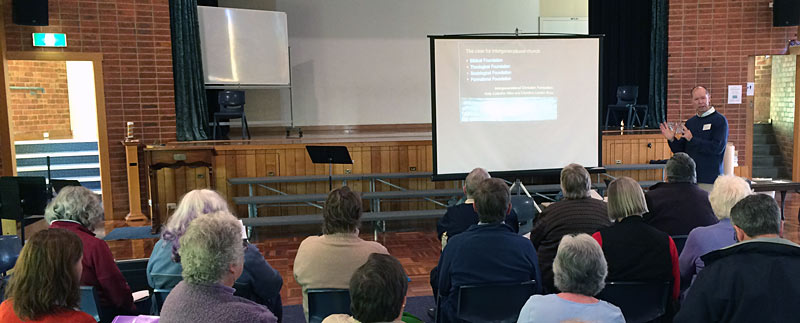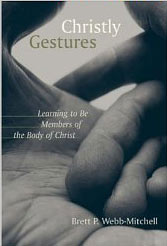A week ago was in Tasmania running sessions on Worship as part of a presbytery event aimed at equipping lay worship leaders. About 35 people from across the state gathered for 2 days of input from people including Chris Barnett (pictured), Steve Terrell, Anne Perrin, Carol Bennett and myself. Wonderful organisation by Michelle Cook and Anthea Maynard.
Here are some of my session resources:
Worship as Formation (plenary session)
 1. Story -“Always” from “Grasshopper on the Road” by Arnold Lobel
1. Story -“Always” from “Grasshopper on the Road” by Arnold Lobel
2. Discuss
- What do you ‘always’ appreciate about worship in your church?
- What ‘always’ annoys you about worship in your church?
3. Dinner at my place
I described that habits of the Mitchell household when people come over to dinner, and then talked about human beings as creatures of habit.
Human beings are creatures of habit. We are shaped by our habits. The patterns of our lives and relationships begin leaving their mark on us from the moment we are born. Who we are is part nature, part nurture. The habits of our families of origin shaped us for better and for worse, and we spend much of our lives both drawing on the strengths they gave us and trying to unlearn the unhealthy scripts that they placed within us.
Any community, large or small, has a culture that is in part the accumulation of many habits – ways of speaking and acting that reveal what we value, what we hope for, what we like and dislike and what we believe. We are shapers of culture but we are also shaped by culture.
One of the reasons that I care about people with disabilities is that my parents adopted my younger brother who has multiple minor and not so minor disabilities. One of the reasons that I can care about indigenous people and their well-being is that my parents fostered my younger sister who was aboriginal. They didn’t have to lecture me about caring, they demonstrated it through some very tough circumstances.
 4. Quote – James K. A. Smith, Desiring the Kingdom, p25.
4. Quote – James K. A. Smith, Desiring the Kingdom, p25.
“Liturgies – whether sacred or secular – shape and constitute our identities by forming our most fundamental desires and our most basic attunement to the world. In short, liturgies make us certain kinds of people, and what defines us is what we love…. [Our] orientation to the world is shaped from the body up more than from the head down. Liturgies aim our love to different ends precisely by training our hearts through our bodies.. They prime us to approach the world in a certain way, to value certain things, to aim for certain goals, to pursue certain dreams, to work together on certain projects. In short, every liturgy… teaches us… to be a certain kind of person.
5. Video – “It’s All About Me”
6. Worship Informs, Forms, Transforms
Christian educator Thomas Groome says that education does three things – it informs, forms and transforms. I want to apply those same three things to worship.
Informs – Worship conveys information to us. By taking part in worship we learn things about the Bible, about what the church is and what it does, about what Christians believe, about what is happening in people’s lives and in our world. We accumulate knowledge and understanding about a whole range of things by participating in worship. Worship ought to help us learn new things about God, the Scriptures, our faith tradition, and about the world in which we live.
Forms – The rhythms and practices of worship shapes our attitudes, values and beliefs. The culture or climate of worship demonstrates for us what is important and what isn’t. The kinds of songs that we sing, how we treat children or people with disabilities or newcomers, how we pray and what we pray about, even the way that the space is arranged – it all communicates, sometime in obvious and explicit ways, and sometimes in subtle yet still powerful ways.
Transforms – Worship that brings us into deep encounter with God can never leave us the same. Worship ought to change us because we never ‘arrive’ as Christians. James Fowler says that we are always “becoming” Christian, always being made Christ-like. If worship leaves us too much the same then we have to ask what isn’t happening. Is there so much clutter that God can’t speak? Is worship all about us and not about God? Or is worship all about God and not enough about living in the world.
7. Discuss
- How has worship informed or instructed you?
- How has worship formed or shaped you?
- How has worship transformed or changed you?
8. The shape of worship as similar to gathering for a meal
I introduced Brett Webb-Mitchell’s notion of Christly Gestures from his book of the same name.
Worship is one of the core practices or habits of the church. We can think of our words and actions within worship as being gestures.
Some quotes from the book:
“… gestures are corporate – learned, practiced, and performed by members of Christ’s body. The community of Christ is re-created by the gestures that embody the story of God’s gospel. Some gestures are particular for an individual’s grace-given gift and service in Christ’s body; others are performed in common and in coordination with other members of Christ’s body”
“gestures are learned in the practice of the gesture itself”
“The community is created and re-created by the gestures people use in social interactions.”
“The story is embodied in the gesture. Performance of the story in gestures is key to remembering whose we are as a people.”
10. We began to explore the gestures of worship through story and example, but didn’t get as far as I’d hoped.
Gathering
Gestures of hospitality and welcome
Gestures of praise and thanksgiving
Gestures of confession and forgiveness
Word & Sacrament
Gestures of hearing and seeing the Scriptures
Gestures of praying and contemplating the Scriptures
Gestures of interpreting the Scriptures
Gestures of sharing Communion
Response
Gestures of responding to the Word
Gestures of offering
Gestures of prayer for others
Gestures of sending and commitment
11. In session two we looked at how we embody gestures.
Video – Rejected by Church
Video – Dalek Relaxation
12. Genuine Gestures
Here are a couple more quotes from Brett plus a list of characteristics of gestures that I made up.
“we decide if a speech act is false or a lie not only if it is misspoken on the part of the speaker but also if it is not congruous with the context in which it is spoken or heard.”
Worship is that place and moment in which we among others in gestures of prayer praise God, where we are caught up in a “hot house;” a “laboratory of experimentation;” of gestures being learned and practiced knowingly or unknowingly.
Is the gesture
– integrated (authentic – word, deed, character)?
– invitational (drawing people into participation)?
– intelligible (does it make sense to people)?
– inspired (Spirit-led – flow, not forced)?
– incarnational (embodying the Christian story)?
Download Worship as Formation Handout (85kb PDF)
– – – – – – – – – – – – – – – – – – – – – – – – – – – – – – – – –
Engaging with the Bible in Life-giving Ways
This brief elective focused on the Psalms. Here are the notes including some excerpts from the Dramatised Bible. We played around with several Psalms in groups – Psalms 8, 51, 63, 100
Download Engaging with the Psalms (1.2mb PDF)
– – – – – – – – – – – – – – – – – – – – – – – – – – – – – – – – –
Multi-sensory Worship
This was mainly a ‘show and tell’ based on a number of worship services that I’ve led over the years. Most of them are on my Mountain Masala Blog under “Worship Resources”.


Leave a Reply